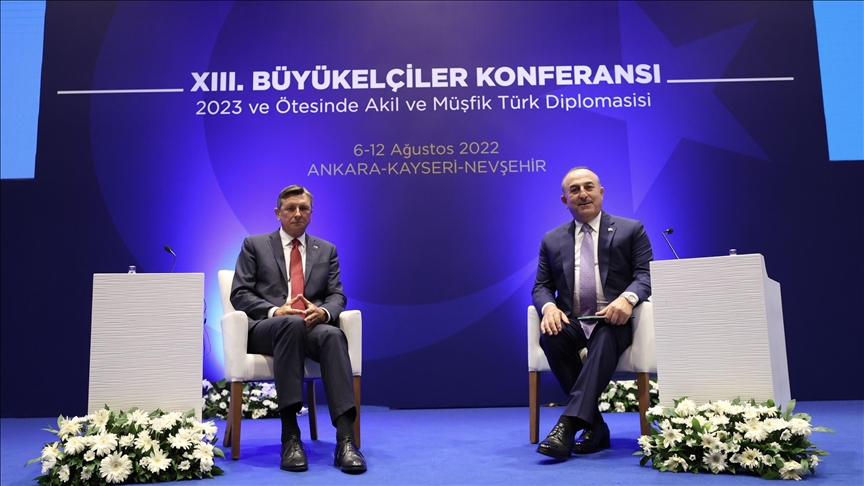'Russian aggression on Ukraine undermines already fragile trust of West'
Ukraine war will bring about 'new bloc division of Europe and the world,' warns Slovenian President Borut Pahor

ANKARA
Russia's war on Ukraine "has fundamentally undermined the already fragile trust between the West and Russia," the Slovenian president said in Türkiye on Tuesday.
Addressing Turkish envoys at the 13th Ambassadors Conference in the capital Ankara, Borut Pahor said, "The decision of (Russian) President (Vladimir) Putin to attack Ukraine was a surprise and disappointment," adding that "Russia's aggression on Ukraine" damaged "the fragile trust" between the West and Moscow.
Mentioning the "good relations" Slovenia and Russia enjoyed for over 15 years until the start of the war this Feb. 24, Pahor said his country "never felt threatened by Russia," while "Eastern European friends have always described Russia as a direct or indirect threat to their security."
However, he said the war changed everything.
Stating that "rational reasons" spoke against Putin's decision on Ukraine, Pahor said he is now "very cautious" about his predictions of the course of events.
New division in Europe
Pahor added that "a new solid trust" between Western states and Russia cannot be built "without a very strong change in the policy of Moscow."
"The war in Ukraine will bring about a new bloc division of Europe and the world without the cessation of the war and a peaceful settlement of the conflict, which is unlikely," he added.
The Slovenian leader said that with the current situation caused by the war, "a new bloc division seems almost inevitable."
He added: "In the new geopolitical division, the Western Balkans will be part of the Western world. But this depends on Brussels as much as on the countries of the Western Balkans."
"The border between the two blocs is already being drawn. However, it is far from being definitive. This may be one of the reasons for the prolongation of the war in Ukraine," he added.
He also said: "Within the newly emerging Russian sphere of influence, there is no room for countries applying for EU and NATO membership."
Therefore, "the longer the EU enlargement process takes, the more these countries will be exposed to Russian appetites, or at least to increasing Russian influence," Pahor said, stressing Bosnia and Herzegovina's "vital" importance.
He added: "I'm trying to do whatever it takes in my power to convince the EU and the West to admit it (Bosnia and Herzegovina) to the EU on a fast- track procedure and if possible, also to NATO."
Türkiye's mediating role
Pahor also saluted Türkiye's "mediating role between Russia and Ukraine," adding that it is "valuable that it is not pushing for peace at any price, but is endeavoring to solve those problem that alleviate the tragedies of the Ukrainian people and the problems of people everywhere in the world."
He also thanked Ankara for reaching a landmark grain export deal with the UN, Russia, and Ukraine.
On July 22, Türkiye, the UN, Russia, and Ukraine signed the landmark deal to reopen three Ukrainian ports for grain that had long been stuck due to the ongoing Russia-Ukraine war, which is now in its sixth month.
A team from the Joint Coordination Center in Istanbul, with representatives from all four sides, inspects each ship before it departs for its destination.
"The EU must fulfill its part of the obligation to which it committed" in the 2016 refugee deal with Türkiye, Pahor continued, adding: "The world is much more interconnected and interdependent, it is globalized. It is in our strategic interest to avoid a new bloc division of the world, any new Cold War."
Pahor also commended ties with Türkiye, saying: “Relations between the two countries are growing stronger every year."
For his part, Turkish Foreign Minister Mevlut Cavusoglu cited the two countries growing relations to the "strategic partnership level" in 2011 and added: "On the 30th anniversary of our diplomatic relations, we continue to develop our relations with Slovenia."
"The aim of both countries is to establish and maintain stability, security, and prosperity in our region," Cavusoglu said.








